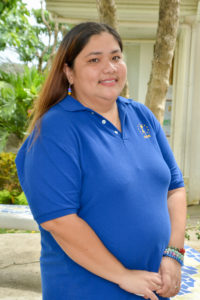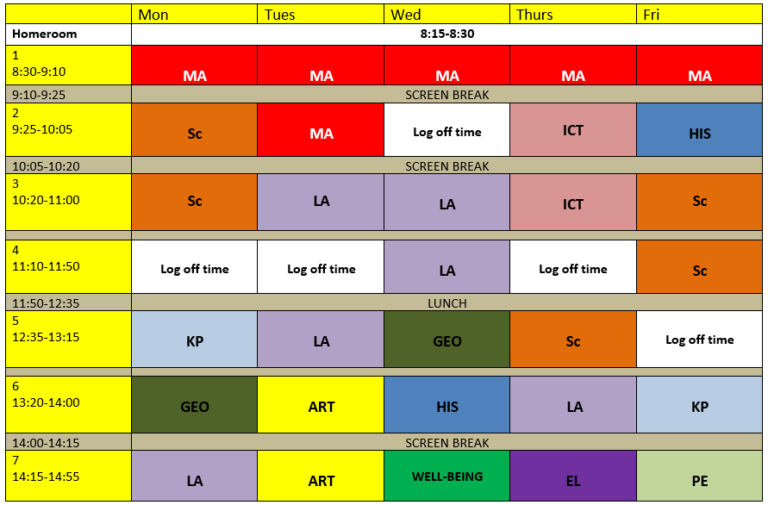Grade 7
Welcome to the Grade 7 page
Below you can find out a little more about school life and what we get up to in Grade 7
Homeroom Teacher

Joan Delgado
Grade 7 Teacher
Curriculum Overview
Language Arts
Reading
- Determine and analyse a theme over the course of a text
- Determine the meaning of words and phrases as they are used in a text
- Compare and contrast a written story, with its filmed version
- Analyse the interactions between individuals, events, and ideas in a text
- Determine and analyse an author’s point of view or purpose in a text
Writing
- Support claims with reasoning and relevant evidence
- Maintain a formal writing style
- Include formatting, graphics, and multimedia to aid comprehension
- Create cohesion and Clarify relationships among ideas and concepts
- Use techniques to engage and orient the reader
- Use transition words, phrases, and clauses to show sequence and signal shifts
- Provide accurate conclusions
- Generate additional questions for further research
- Draw on texts to support analysis, reflection, and research
In addition to course text books class novels will include:
- Lord of the Flies (W. Golding)
- Hatchet (G. Paulsen)
Speaking & Listening
- Come to discussions prepared
- Respond to, and pose questions that elicit elaboration
- Analyse main ideas and supporting details
- Clearly present claims and findings
- Adapt speech to a variety of contexts and tasks
Grammar
Students will build on grammar practice in grade 6 to include:
- Use of Verbs – active and passive voice, and indicative, imperative, interrogative, conditional, and subjunctive
- Use an ellipsis to indicate an omission
- Use context as a clue to the meaning of a word or phrase
- Use figurative language, word relationships, and nuances in word meanings
- Interpret figures of speech
History
- Analyze Philippine History from the pre-colonial era to Edsa I
- Identify the major characteristics and effects of the Industrial Revolution
- Trace the origins and development of Slavery; its effects on black Americans (region’s political, social, religious, economic, and cultural development); and identify the strategies that were used to both overturn and preserve it
- Identify the cause and effect in the key events of the struggle of desegregation and Civil Rights
Geography
- Examine how Population Growth has spread throughout the world
- Understand the key processes relating to Coastal Landforms and human use of coastal areas
- Interpret Maps and Diagrams
- Understand the key processes in Weather & Climate
- Interpret local and Global Weather Maps
- Understand the processes that give rise to global warming and how they change over time
- Develop knowledge of regions within Asia, to include both physical & human features
Physical Education
- Be able to throw and pass the ball
- Dribble with the dominant and non-dominant hand
- Show skills in dribbling
- Apply legal underhand serving in badminton and volleyball
- Show coordinated walking, running, jumping and landing
- Describe and demonstrate the difference between dynamic and static stretches
- Exhibit responsible behavior
- Demonstrate the importance of social interaction
Art
Drawing and Painting
- Increase one’s understanding of the basics of drawing/painting and to produce successful work
- Demonstrate skills and design to express and communicate meaning
- Identify art movements and influential artists according to locations and historical periods
- Critique works of art with reference to the elements of art and design
- Describe criteria affecting the work of art
- Create works of art representing subject matter and begin building a portfolio
Arts and Crafts
- Create and utilizing materials to invent new designs
Science
Life Science
- Infer how traits of organisms are passed on through the transfer of genetic information during reproduction following the patterns of inheritance (genetics), variation and adaptation
- Classify organisms using concepts in taxonomy and systematics (Plant Structure and Reproduction; Vertebrate and Invertebrate Animals)
Physical Science
- Understand the basic concepts behind the atomic nature of matter; describe physical and chemical properties of matter; differentiate physical and chemical changes
- Predict the motion of objects to opposing forces (balanced or unbalanced) along the line of travel; measure, record and compute for average speed
- Explain the basic concepts behind the atomic nature of matter (sub-atomic particles and forces, elements of the periodic table, molecules and compounds)
Earth and Space Science
- Define heat, density and buoyancy and explain how heat is transferred in Earth’s Systems
Mathematics
Numbers and Operations
- Be able to add, subtract, multiply and divide integers and rational numbers
Ratios and Proportional Relationships
- Solve Rates and Proportionality; Proportion and Percent
Geometry
- Model geometric figures
- Solve Circumference, Area, and Volume
Expressions and Equations
- Use properties of operations to generate equivalent
- Expressions; Solving real-life and mathematical problems using equations and inequalities
Statistics
- Random sample and population:
- Analyse and compare data
Probability:
- Use Experimental probability
- Theoretical probability and simulations
ICT
Microsoft Publisher
- Introduce the program and its importance
- Explore MS Publisher Toolbars
- Discuss basic layout and format
- Create flyers, brochures, cards, calendars, labels and newsletters
Web Browsing Skills
- Discuss Cyber Ethics
- Know how to cite online sources properly
Adobe Photoshop
- Learn basic photo editing
KP
Language
- Learn basic Filipino Language for Communication III Language in Mindanao
Government
- Explain the Structure and the function of the modern Philippine Government
Geography
- Explain the reasons why Philippines is in the ring of fire
- Identify and interpret the location of the active volcanoes in the Philippine map
Culture/Festivals
- Learn Filipino culture, customs, etiquette, traditions, beliefs, and practices to understand Filipinos better
- Experience different kinds of festivals in every part of the Philippines

